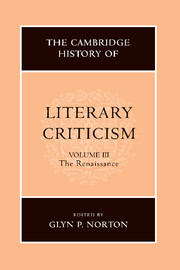Book contents
- Frontmatter
- Introduction
- READING AND INTERPRETATION: AN EMERGING DISCOURSE OF POETICS
- POETICS
- I Humanist classifications
- II The rediscovery and transmission of materials
- III Rhetorical poetics
- IV Literary forms
- 20 Italian epic theory
- 21 The lyric
- 22 Renaissance theatre and the theory of tragedy
- 23 Elizabethan theatrical genres and literary theory
- 24 Defining comedy in the seventeenth century: moral sense and theatrical sensibility
- 25 Dialogue and discussion in the Renaissance
- 26 The essay as criticism
- 27 The genres of epigram and emblem
- 28 Humour and satire in the Renaissance
- THEORIES OF PROSE FICTION
- CONTEXTS OF CRITICISM: METROPOLITAN CULTURE AND SOCIO-LITERARY ENVIRONMENTS
- VOICES OF DISSENT
- STRUCTURES OF THOUGHT
- NEOCLASSICAL ISSUES: BEAUTY, JUDGEMENT, PERSUASION, POLEMICS
- A SURVEY OF NATIONAL DEVELOPMENTS
- Bibliography
- Index
- References
24 - Defining comedy in the seventeenth century: moral sense and theatrical sensibility
from IV - Literary forms
Published online by Cambridge University Press: 28 March 2008
- Frontmatter
- Introduction
- READING AND INTERPRETATION: AN EMERGING DISCOURSE OF POETICS
- POETICS
- I Humanist classifications
- II The rediscovery and transmission of materials
- III Rhetorical poetics
- IV Literary forms
- 20 Italian epic theory
- 21 The lyric
- 22 Renaissance theatre and the theory of tragedy
- 23 Elizabethan theatrical genres and literary theory
- 24 Defining comedy in the seventeenth century: moral sense and theatrical sensibility
- 25 Dialogue and discussion in the Renaissance
- 26 The essay as criticism
- 27 The genres of epigram and emblem
- 28 Humour and satire in the Renaissance
- THEORIES OF PROSE FICTION
- CONTEXTS OF CRITICISM: METROPOLITAN CULTURE AND SOCIO-LITERARY ENVIRONMENTS
- VOICES OF DISSENT
- STRUCTURES OF THOUGHT
- NEOCLASSICAL ISSUES: BEAUTY, JUDGEMENT, PERSUASION, POLEMICS
- A SURVEY OF NATIONAL DEVELOPMENTS
- Bibliography
- Index
- References
Summary
In the seventeenth century, comedy is a genre in search of an identity. Its association with traditions of popular entertainment and the absence of coherent classical principles give it lower prestige than tragedy or epic, and writers set out during this period to articulate criteria which will define and enhance its literary value. Much early criticism concentrates on form. In France, writers of pastoral stress the value of a new regular and non-tragic drama in the Italian mode, and prefaces often focus on questions of structure applicable to both tragedy and comedy. Ben Jonson's comments in his Discoveries themselves much influenced by Daniel Heinsius and Julius Caesar Scaliger, draw attention to features common to both genres, and the same outlook informs Pierre Corneille's first Discours where he applies to comedy some of the principles outlined in Aristotle's Poetics. Corneille's theoretical analysis is complemented by a series of critical readings (Examens) of his own early comedies which often single out deficiencies in construction or subject their specifically comic features to strict formal scrutiny. Such structural approaches imply that comedy is worthy of serious consideration, but do little to distinguish it from other genres. Terminology is often imprecise, and at the beginning of the century in France the term comédie may be used to designate any kind of play from farce to tragicomedy. Most comedies claim to represent life as it is, unlike tragedy with its historical plots, but there can be great variety among the texts produced. In his preface to La veuve (1634), Corneille defines the genre as a reflection of the tastes of his (increasingly refined) audience [‘La comédie n'est qu'un portrait de nos actions et de nos discours’].
- Type
- Chapter
- Information
- The Cambridge History of Literary Criticism , pp. 259 - 264Publisher: Cambridge University PressPrint publication year: 1999
References
- 1
- Cited by



